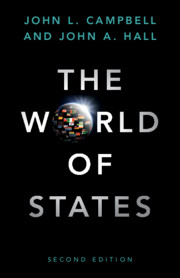Book contents
- The World of States
- The World of States
- Copyright page
- Contents
- Tables
- Preface to the First Edition
- Preface to the Revised, Second Edition
- Introduction
- 1 The Past
- 2 Conditions of Existence, Old and New
- 3 Challengers?
- 4 States of the Global South
- 5 The North
- 6 Still the Strongest Power on Earth?
- Conclusion
- References
- Index
6 - Still the Strongest Power on Earth?
Published online by Cambridge University Press: 28 May 2021
- The World of States
- The World of States
- Copyright page
- Contents
- Tables
- Preface to the First Edition
- Preface to the Revised, Second Edition
- Introduction
- 1 The Past
- 2 Conditions of Existence, Old and New
- 3 Challengers?
- 4 States of the Global South
- 5 The North
- 6 Still the Strongest Power on Earth?
- Conclusion
- References
- Index
Summary
The functional responsibilities of the state that we have identified are clearly met by the United States, although we will add some comments to this edition of the book that consider the revelations of the last few years. The internal ordering of the state is not in question, although it contains both the splendor of great universities and the misery of prisons and ghettos for too many African-Americans. Just as obvious is the fact that the United States is the only power in the North wholly in charge of its own security, not least as it still benefits from having oceans to protect it from most of its neighbors. That there would be a single type of belonging was of course firmly established in the nineteenth century as the result of vicious civil war, removing the putative national identity of the South. Postwar allegiance to American values has become extremely high, in part because of the flexibility of American national identity: this may be about to change in politics if not society at large.
- Type
- Chapter
- Information
- The World of States , pp. 186 - 218Publisher: Cambridge University PressPrint publication year: 2021

